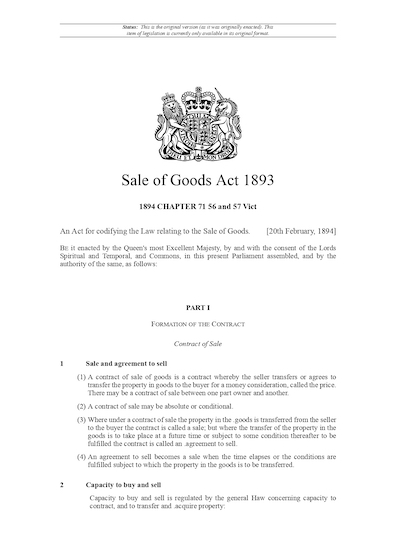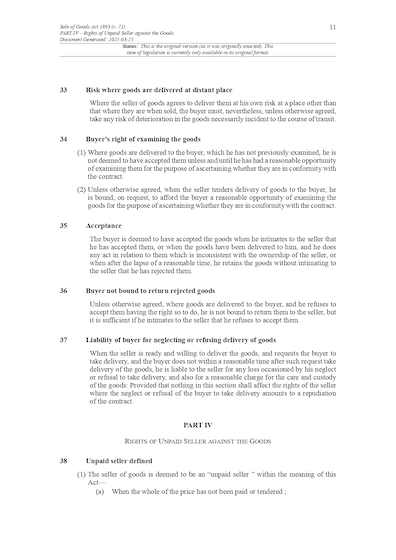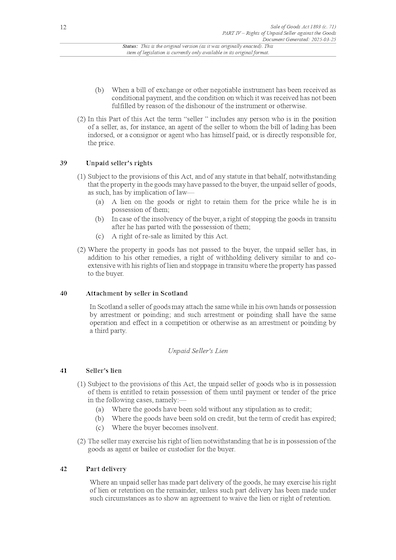Parody. (In Cyclops, whose narrative
periodically gives way to wildly parodic commentaries on the
action, the first words of each such passage are highlighted
in purple, linking to a note on the kinds of mimicking
involved.) "For nonperishable goods bought of Moses Herzog…
the said purchaser, his heirs, successors, trustees and
assigns of the other part": the chapter's first mocking
irruption, one very long sentence, characterizes an
unremarkable sale of tea and sugar in the kind of detailed
contractual legalese one might encounter in a much heftier
financial transaction. This, then, is the first of many
examples of stylistic gigantism. It makes a mountain out of a
molehill.
Slote, Mamigonian,
and Turner note that "Joyce derived the basic parameters of this
sentence from an article in the London
Times, but he
changed the specific details: 'At Limerick Quarter Sessions this
evening [...] plaintiff, Max J. Blond, a Jew, sued to recover
for goods supplied to one James Rahilly. The claim was listed
for hearing at the last sessions, but adjourned owing to the
friction between the Jews in the city and a section of the
population' (1 June 1904, p. 10, col. e). Joyce recorded this in
the so-called 'lost notebook' (Danis Rose and John O'Hanlon,
The
Lost Notebook, p. 23)."
No doubt the newspaper article gave Joyce some genetic
"parameters" for the entire drama of
Moses Herzog and William
Geraghty—"goods" supplied but not paid for, a Jew
demanding payment from a Christian, bad feeling between the two
ethnic groups—but the workaday journalistic prose of the article
can hardly be said to have inspired this one parodic sentence.
Stylistically, it sounds like the language of a contract rather
than a suit "to recover for goods." Gifford ventures to say that
"The style is that of a legal document in a civil suit for
nonpayment of debts," but that does not seem quite right, as the
sentence makes no mention of a court action. Perhaps he means
that a binding contract of this sort might be entered into
evidence in a suit for nonpayment, but, if so, he is indulging
in hypotheticals. Joyce's text, unlike the newspaper article,
never indicates that Herzog has even threatened legal action.
Indeed, it shows that he has opted to pursue an alternative
course: hiring the chapter's narrator to act as a "
Collector
of bad and doubtful debts," which Gifford notes was
"Regarded in Ireland as the lowest of occupations, almost as bad
as a career in petty crime." This man has been hounding Geraghty
"for the past fortnight and I can't get a penny out of him." It
is the mendacious purchaser, not the innocent seller, who has
responded with threats of legal action: "
Tell him, says
he,
I dare him, says he,
and I doubledare him to send
you round here again or if he does, says he,
I'll have
him summonsed up before the court, so I will, for trading
without a licence." Christians in these times often
regarded repayment of Jewish merchants as optional, leaving the
merchant with no options but forbearance.
Rather than intimating legal action, the absurdly extended
sentence lays out the terms under which certain amounts of tea
and sugar, precisely measured by "avoirdupois" weight, will be
transferred from Herzog to Geraghty but not legally
relinquished: as "debtor to the said vendor of one pound five
shillings and six pence sterling for value received," Geraghty
will pay off his debt in "weekly installments" of "three
shillings and no pence," with the understanding that the goods
"shall not be pawned or pledged or sold or otherwise alienated
by the said purchaser but shall be and remain and be held to be
the sole and exclusive property of the said vendor to be
disposed of at his good will and pleasure until the said amount
shall have been duly paid by the said purchaser." In other
words, Geraghty will not legally own the tea and sugar until he
finishes paying off his debt. They will remain the property of
Herzog.
This careful contractual language involving an unpaid vendor's
right to "dispose" of his goods seems rather disproportionate to
mundane particulars:
a Jew has peddled some foodstuffs
door-to-door in a Christian neighborhood, one of his
customers has promised to pay later, and the Gentile has stiffed
the Jew. Joyce points up the bathetic mismatch at the end of the
sentence by making the contract hold between "
the said
vendor, his heirs, successors, trustees and assigns of the one
part and the said purchaser, his heirs, successors, trustees
and assigns of the other part." Like the entwining of two
great family estates, it seems that this debt relationship may
be passed down through the men's descendants and agents for
years. If a court case were to ensue, it would more closely
resemble Dickens's Jarndyce v. Jarndyce than the sorts of
low-stakes quarrels heard by
Sir Frederick Falconer (who
would no doubt deliver cursory judgment in favor of the
Christian).
The Sale of Goods Act passed by the British Parliament in
1893 addressed the need for financial contracts to specify the
price (which Joyce's sentence does) and the "time of payment."
About the latter, it notes that "In a contract of sale 'month'
means prima, facie calendar month." Joyce echoes this kind of
exactitude exactly: "which amount shall be paid by said
purchaser to said vendor in weekly instalments every seven
calendar days." The act also defined (in Part IV) the
"Rights of Unpaid Seller against the Goods" and (in Part V)
"Actions for Breach of the Contract." Joyce clearly had
something like the former in mind when he wrote about goods
remaining "the sole and exclusive property of the said
vendor." But even though Cyclops often alludes
to judicial matters (it takes place near the Four
Courts), it does not mention any legal actions that the
vendor might take against the purchaser.


